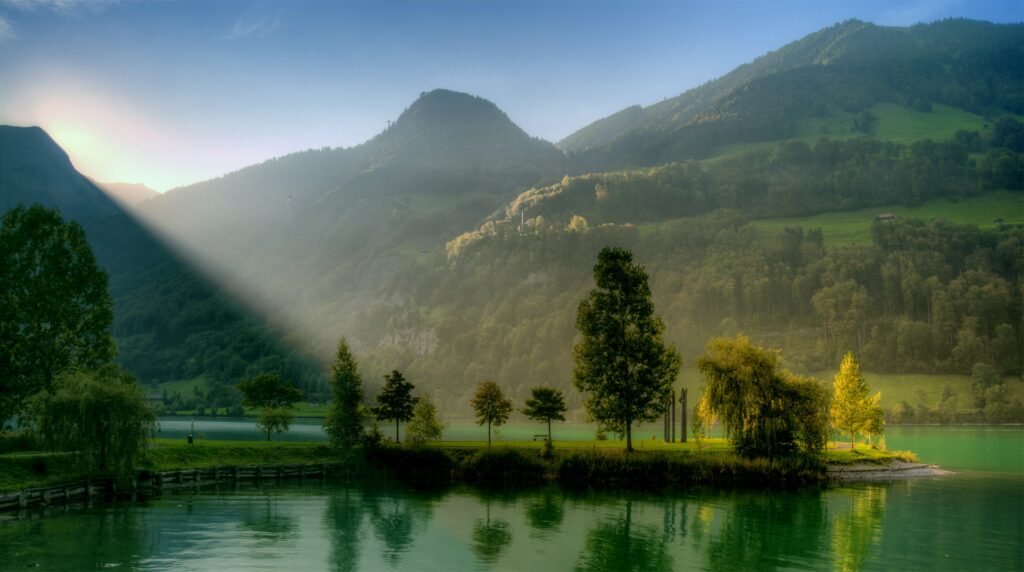Our Planet | Netflix | Documentary Series (click here)
In an age of rapid technological advancements and relentless urbanization, humanity’s connection to nature is more important than ever.
While modern conveniences and digital progress offer many benefits, they often come at the expense of our mental, emotional, and even physical health.
Many of us find ourselves feeling stressed, disconnected, and overwhelmed in the chaos of daily life.
However, nature holds a unique and powerful remedy to these challenges—a remedy that has been validated by both ancient wisdom and modern science.
Reconnecting with nature is more than just a recreational activity; it’s a return to our roots.
Time spent in natural environments not only calms the mind but also revitalizes the body and enhances emotional resilience.
Through centuries, humans have recognized the therapeutic potential of nature, but today, researchers and scientists are discovering just how deep and impactful this connection truly is.
The Biological Connection: Why Nature Calms Us


Humans have evolved over millions of years in close interaction with nature.
Our ancestors lived in natural environments, deeply attuned to the rhythms of the earth.
As a result, our brains are biologically wired to respond positively to natural stimuli. This innate connection, sometimes referred to as “biophilia,” explains why we feel at ease when surrounded by green spaces, flowing water, and open skies.
- Nature Reduces Stress Hormones
One of the most significant benefits of spending time in nature is its ability to lower stress levels. In today’s world, chronic stress has become a pervasive issue, contributing to a range of health problems, including anxiety, depression, heart disease, and sleep disorders. Research published in the International Journal of Environmental Research and Public Health found that spending time in nature significantly lowers levels of cortisol, the body’s primary stress hormone. In fact, a 20-minute walk in a natural setting has been shown to reduce cortisol levels by 10-20% . - The “Restorative” Power of Nature
Nature engages our senses in a way that allows for cognitive restoration. Urban environments, with their constant stimuli—such as noise, crowds, and screens—tax our attention and drain mental energy. The Attention Restoration Theory (ART), developed by researchers Stephen Kaplan and Rachel Kaplan, suggests that spending time in natural environments allows the brain to recover from this mental fatigue. The effortless engagement with nature’s sights, sounds, and textures replenishes our cognitive resources, improving focus and clarity of thought. - Green Spaces and Mental Health
A growing body of research highlights the strong correlation between proximity to green spaces and mental health benefits. A landmark study conducted in the United Kingdom by the University of Exeter found that individuals who live near parks or nature reserves report significantly lower rates of mental health issues, including depression and anxiety. This effect remained consistent across various demographic factors such as age, income, and gender. Even small doses of nature—like a garden or a view of trees from a window—can have profound psychological benefits.
Nature’s Healing Properties: Physical and Emotional Benefits
Nature not only provides mental clarity but also offers tangible healing properties for our physical health and emotional resilience.
In many cultures, nature has long been viewed as a source of medicine, and now science is catching up, demonstrating that natural environments can promote recovery and improve overall well-being.
- Nature Boosts the Immune System
One of the most surprising findings in recent years is the impact of nature on the immune system. Researchers in Japan have pioneered a practice called “Shinrin-yoku,” or forest bathing, which involves immersing oneself in a forest environment. Studies from the Nippon Medical School in Tokyo found that forest bathing significantly boosts the activity of natural killer (NK) cells, a type of white blood cell that plays a critical role in the body’s defense against infections and cancer. This increase in immune function has been linked to the inhalation of phytoncides, organic compounds released by trees that have antimicrobial properties. - Faster Recovery in Natural Settings
Hospitals and healthcare providers are beginning to recognize the role of nature in physical healing. Research published in Science by Roger Ulrich found that patients recovering from surgery experienced faster recovery times, required less pain medication, and had fewer complications when they had a view of nature compared to those whose windows faced a wall. Nature’s ability to reduce pain and speed up healing can be attributed to its calming effects and its capacity to lower stress, which is known to slow down the body’s recovery processes. - Emotional Resilience and Nature
Beyond the physical, nature also plays a powerful role in cultivating emotional resilience. Regular exposure to natural environments has been shown to increase feelings of self-worth, reduce feelings of loneliness, and improve mood. A study conducted by the University of Essex in the UK found that walking in nature reduced symptoms of depression in 71% of participants. Nature provides a space for reflection, calm, and emotional renewal, offering a sense of perspective and helping individuals process difficult emotions.
Nature and Determination: Building Grit Through Outdoor Experiences
While nature is often associated with relaxation and calmness, it also has a role to play in fostering determination and resilience.
Experiences in nature challenge both the mind and body, encouraging individuals to push through obstacles and develop mental toughness.
This is especially true in outdoor activities like hiking, climbing, or endurance sports, which require focus, perseverance, and the ability to overcome discomfort.
- Outdoor Challenges Build Grit
The concept of “grit”—a combination of perseverance and passion for long-term goals—has been extensively studied by psychologist Angela Duckworth. Nature offers the perfect environment for developing grit, as outdoor activities often present unexpected challenges that test physical and mental endurance. Whether it’s hiking up a steep mountain or navigating through unpredictable weather, the natural world forces individuals to confront their limits and push beyond them. - Nature Encourages Problem-Solving and Creativity
Spending time in nature has also been linked to enhanced problem-solving skills and creativity. In a study published in PLOS ONE, researchers found that participants who spent four days in the wilderness without access to technology saw a 50% increase in creativity and problem-solving abilities. Nature strips away distractions and forces us to engage deeply with our surroundings, encouraging innovative thinking and adaptability—qualities that are essential for determination and long-term success. - Mindfulness and Focus in Nature
Nature provides an ideal setting for practicing mindfulness, a state of focused attention that has been shown to improve concentration and emotional regulation. Practicing mindfulness in a natural environment amplifies its effects, as nature naturally promotes a sense of presence and awareness. Studies conducted by the Greater Good Science Center at UC Berkeley have found that individuals who practice mindfulness in nature report heightened focus and a greater ability to stay determined in the face of distractions and challenges.
Scientific Support for the Healing Effects of Nature
- The Role of Forest Bathing (Shinrin-yoku)
A meta-analysis published in the Environmental Health and Preventive Medicine Journal reviewed studies on forest bathing and found that spending time in forest environments reduced blood pressure, decreased cortisol levels, and improved parasympathetic nerve activity. The calming and restorative benefits of forests are now being used as a preventive health measure in countries like Japan and South Korea, where people are encouraged to engage in regular forest therapy sessions. - Green Exercise
Combining physical activity with exposure to nature—known as “green exercise”—has been shown to produce amplified health benefits. Research from the University of Essex highlights that individuals who engage in outdoor exercise, such as walking, cycling, or running in natural settings, experience greater improvements in mood, self-esteem, and vitality compared to those who exercise indoors. These effects are particularly strong for individuals experiencing mental health challenges like depression or anxiety. - Nature and Longevity
Long-term exposure to natural environments has also been linked to increased life expectancy. A study conducted by Harvard University and published in Environmental Health Perspectives found that women who lived in areas with more green spaces had a 12% lower mortality rate compared to those living in urbanized areas. The study highlighted reduced rates of respiratory disease, cancer, and cardiovascular disease among those with greater exposure to nature.
Conclusion: Embracing Nature for a Healthier, More Determined Life
In the fast-paced modern world, the importance of reconnecting with nature cannot be overstated.
Nature’s healing properties—backed by an ever-growing body of scientific research—offer powerful benefits for both mental and physical health. From lowering stress and boosting the immune system to enhancing emotional resilience and fostering determination, nature provides a holistic solution to many of the challenges we face today.
As we navigate the complexities of life, turning to nature can offer calm, clarity, and strength. Whether it’s a short walk in the park or an extended hike in the wilderness, immersing ourselves in nature is a simple yet profoundly transformative practice that has the potential to heal and empower us in ways modern life often fails to do.
The mental health benefits of nature: Spending time outdoors to refresh your mind (click here)



















